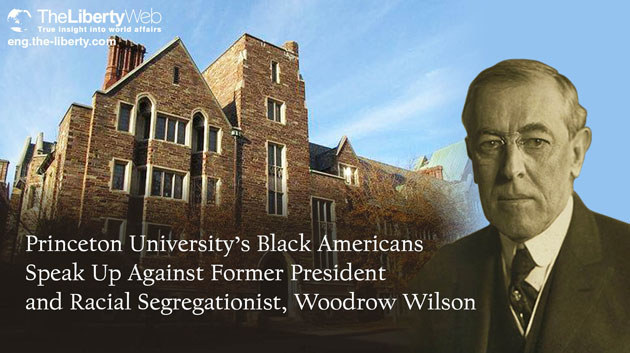Princeton University’s Black Americans Speak Up Against Former President and Racial Segregationist, Woodrow Wilson
At Princeton University, a group of Black American students occupied the President’s room, demanding that the institution erase the name of Woodrow Wilson, the 28th president of the U.S. and former president of Princeton University, from campus.
Among those places named after the former president are the Woodrow Wilson School of Public and International Affairs and a distinct residential complex, known as the Woodrow Wilson College, which includes six dormitories, a dining hall, and a social center.
The current president of Princeton University, Christopher L. Eisgruber, expressed his intention to accept the students’ demands; to acknowledge Woodrow Wilson’s racist side and to talk about removing the former president’s name from the university and to consider removing his mural at the next university conference. Eisgruber is, however, against the complete removal of the name of a person who contributed to the establishment of the League of Nations.
Woodrow Wilson Dismissed Japan’s “Racial Equality Proposal”
Why are Black American students still criticizing Woodrow Wilson? In actual fact, these students’ activities are not unrelated to Japan.
The League of Nations was established in the post-WWI Paris Peace Conference of 1919. It was here that Japan raised a “Racial Equality Proposal” to add to the principles of the League. The proposal was met with a majority approval, but some countries such as England disapproved. Woodrow Wilson, who presided over the Conference, completely rejected the idea saying that anything other than a unanimous approval was unacceptable.
The Japan side pressed him that everything else was done by majority vote, and that it was unreasonable to demand a unanimous approval for just that proposal. Through his decision, Woodrow Wilson implicitly encouraged the continuation of racism.
Japan Was Giving Hope to the People of Asia and Africa
Japan was the first country to propose racial equality at an international conference, and so this was a historic moment. It gave much hope and courage to people in Asia and Africa who were suffering under British and American colonialism.
A contemporary commentator from the National Association for the Advancement of Colored People (NAAPC) said ‘We people of black descent, greatly respect Japan for having sustained a debate regarding racial discrimination at the Peace Conference’, and ‘all 12 million Black Americans are holding their breaths in anticipation.’
This all reveals that Japan fought the Great East Asia War with a mission for racial equality.
Princeton University Still Has the Strong Characteristic of Evicting Blacks
Woodrow Wilson’s racist traits were probably due to his being a Southerner. He was the first Southern man to become President since the American Civil War. At that time in the South, Black Americans had been deprived of their citizenship, and a new law was formed to quarantine colored people. With his inauguration, he introduced a new policy evicting all Black American personnel.
This way of thinking influenced Princeton University, where he served as president before he became a politician. As the president of Princeton, he posed to reject all Black American entrant candidates. Due to this, Princeton University was very slow in accepting Black American candidates compared to other Ivy League universities such as Harvard and Yale.
Even now, Black American students at Princeton University feel as if they are being evicted, leading to the kind of racial equality movements as discussed earlier.
American history goes hand-in-hand with issues of racism. The U.S. will soon come to face incidents and occurrences that will make it reconsider white supremacy.



















